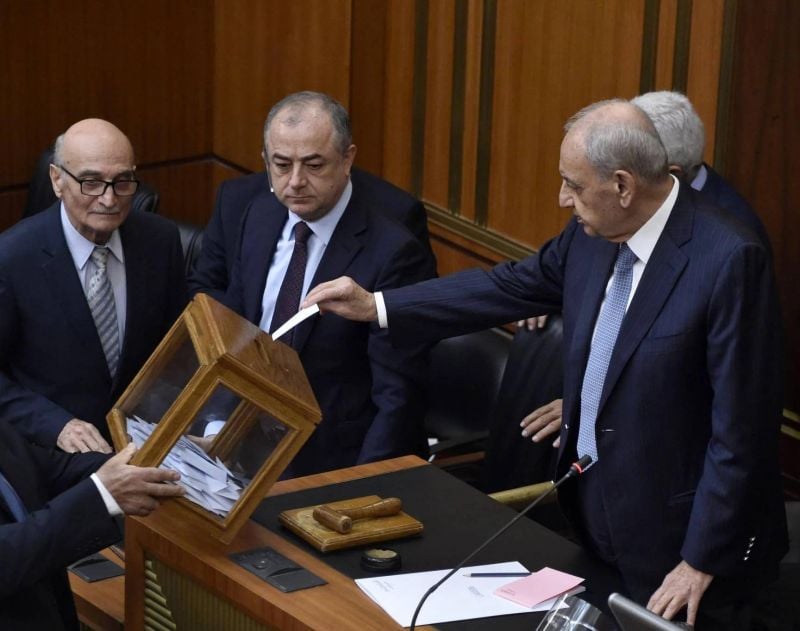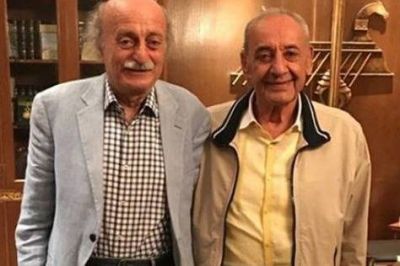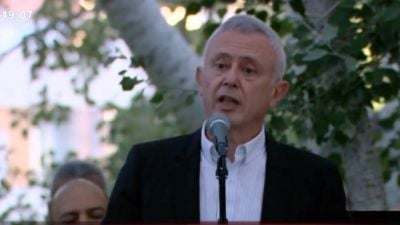
House Speaker Nabih Berri placing a ballot paper in the ballot box during a parliamentary election session, January 19, 2023. (Credit: Hassan Ibrahim / Lebanese Parliament)
BEIRUT — On Wednesday at 11 a.m., the Lebanese Parliament is due to meet to elect the next Lebanese President. This marks the 12th session of this sort since September 2022. However, Wednesday's session is expected to mark a turning point compared to previous ones: for the first time, the Free Patriotic Movement (FPM), Hezbollah and Amal are not expected to vote blank.
Votes are expected to be split mainly between Jihad Azour and Sleiman Frangieh. But who are these two candidates and how should the votes be distributed among the different groups? Is the electoral session at risk of being blocked by certain parties? What is the background of this election?
With just a few hours to go, let's take a quick look at the main points to keep in mind in the run-up to this twelfth ballot attempt.
Names in the running
While MPs can put any name they like on their ballot paper, two are likely to appear on dozens of ballot papers: those of Marada leader Frangieh and former Finance Minister Jihad Azour. The former has been officially supported for several months by Hezbollah and the Amal movement, while the latter's candidacy has recently been the subject of an agreement between several opposition parties and the Free Patriotic Movement.
However, other names could also emerge from the ballot box: opposition MP Elias Jaradeh announced over the weekend that he intended to vote for former Interior Minister Ziad Baroud. He could be followed by several of his colleagues. As has been the case with every session, symbolic slogans are expected to be cast by MPs who do not wish to choose from the two most popular candidates, or who wish to send a message. These ballots, if they do not contain a first and last name, will be considered invalid and canceled when votes are counted.
Potential deadlock scenarios
For the session to take place, 86 MPs, or two-thirds of the total 128 MPs, must be present. Then, to be elected, a candidate must obtain 86 votes in the first round, or 65 in the second. According to the jurisprudence established by Berri, each new session opens with a first round of voting requiring 86 votes. This has been contested by many MPs.
These rules offer deputies several possibilities for blocking the voting process. If a party wishes to avoid the first round of voting, orders can be given to its members to refrain from participating so that the attendance quorum is not reached. This was the case for example, at the second electoral session which took place on October 13, 2022. Similarly, if a party does not want to risk a second round, which requires only 65 votes for election, deputies can blow up the quorum before the second round. This has been the case in ten of the previous 11 sessions.
Who's going to vote for whom
In the face-off Azour is expected to win around sixty votes. These would come from the following: Lebanese Forces MPs and Camille Chamoun (19), the Progressive Socialist Party (8), the Kataeb (4), the Renewal bloc, comprising Michel Moawad, Ashraf Rifi, Fouad Makhzoumi and Adib Abdelmassih (4), at least five deputies from the Forces of change and two independents. As for the FPM, if the party's political council obliges all deputies (17) to vote for Azour, a rebel fringe could stand out.
The votes guaranteed to Frangieh will come from the Hezbollah bloc (15), the Amal movement (15) and the Marada and its allies (the National Regrouping bloc, (4). The National Entente deputies (5), are also expected to vote for the Marada leader.
The former Future Movement MPs of the so-called National Moderation group are not expected to opt for either candidate, a position similar to that of the deputies from Saida and Jezzine. Uncertainty continues to surround the choice of the Tachnag and several independent and protest MPs.
Verbal escalation
Since the announcement by the opposition and the FPM of their support for Azour's candidacy, the tone of Hezbollah officials' speeches has hardened, as they consider Azour to be a candidate of "defiance and confrontation."
In this context, MP Hassan Fadlallah stated that Azour "will not make it to Baabda." The daily al-Akhbar, linked to Hezbollah, briefly published a photo of the IMF executive alongside former minister Mohammad Chatah, assassinated in 2013. Chatah's relatives and detractors accuse Hezbollah of being behind the assassination. After an outcry, the photo was quickly modified.
The candidates' key phrases
On Sunday and Monday, Frangieh and Azour expressed their positions ahead of Wednesday's session.
In a speech on the occasion of the commemoration of the Ehden massacre of June 13 1978, Frangieh asserted that he had "no problem if another candidate is the subject of a broad agreement," and called on all parties to engage in dialogue. However, he criticized the choice of his opponents to support the candidacy of Jihad Azour, who in his view, is part of the "ruling system." Franjieh asserted that he was not ashamed of "belonging" to a certain political camp and recalled that he was the heir to a family that had been present on the political scene for over a century.
On Monday, in the statement officially announcing his candidacy, Azour said that he "is not the descendant of a major political family [or] the hero of a specific sect." He also said that he was not a "defiant" candidate and that he wished to unite the Lebanese around a project to revive the country.
And what about the international community?
At some point, France supported Frangieh’s candidacy out of "pragmatism" as part of a negotiation that the Prime Minister post would go to the opposition candidate, but this initiative seems to have fizzled out. Since then, French Foreign Minister Catherine Colonna has reiterated that France "has no candidate,” and Emmanuel Macron has appointed his former head of diplomacy, Jean-Yves Le Drian, as special envoy for Lebanon. The latter is due to visit Beirut sometime next week.
Maronite Patriarch Bechara al-Rai, who visited Paris and the Vatican at the end of May, was tasked with holding talks with all the Lebanese parties involved in the elections, including Hezbollah.
For its part, the United States announced in early June that it was considering sanctions against those responsible for blocking the election, in a possible allusion to Berri who had not called a session since January. The day after the threat, Berri issued a statement clearing himself of responsibility for the blockage.
The international community in general has regularly called for the election of a president and the implementation of reforms to get the country back on track and obtain financing that could help end the crisis.


